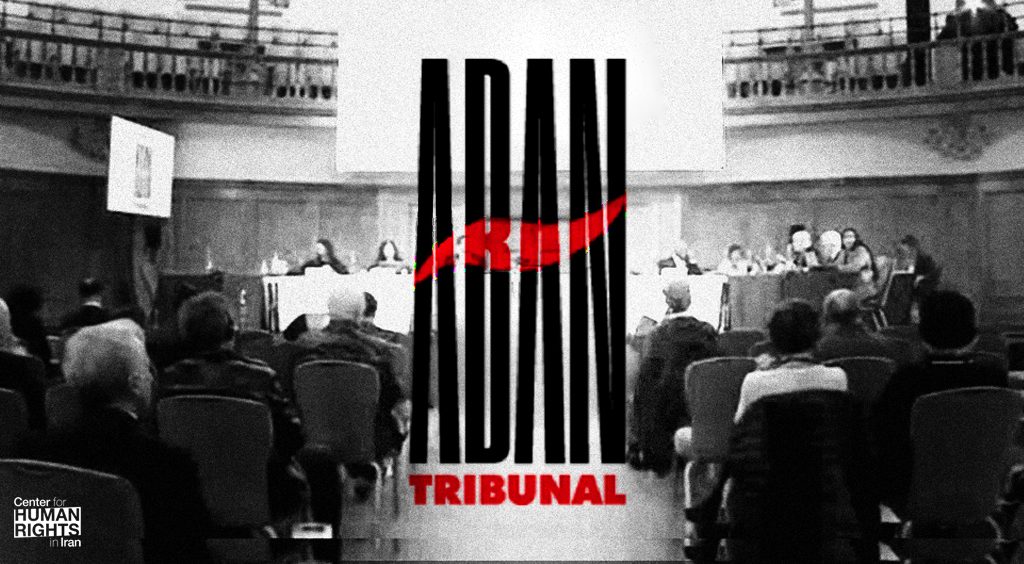Iran Atrocities Tribunal on November 2019 Massacre: A Major Step towards Seeking Justice
 International Community Must Finally Act with One Voice to Address these Crimes
International Community Must Finally Act with One Voice to Address these Crimes
Evidence of the Islamic Republic’s Top Officials Directly Involved in the Atrocities
November 15, 2021 — The Iran Atrocities Tribunal (or “Aban Tribunal”), an independent People’s Tribunal held in London to investigate the killing and wounding of thousands of protesters by state security forces in Iran in November 2019, and which has just completed five days of hearings, is a major step forward in documenting this unprecedented crime by the Iranian state, the Center for Human Rights in Iran (CHRI) said today.
During five days of public hearings from November 10-14, 2021, 33 witnesses, including many inside Iran, as well as experts and researchers abroad, publicly testified, and 145 testimonies have been recorded. These testimonies reconstruct the November 2019 massacre, which was largely obscured by the Iranian government’s shut down of the internet in Iran as it sought to prevent details of these crimes from emerging.
“The Aban Tribunal has given public voice to scores of victims and witnesses who undertook grave risks to testify on Iran’s massacre of hundreds of protesters in November 2019, in their continuing search for justice two years after these atrocities,” said CHRI executive director Hadi Ghaemi.
“There is no possibility of redress or legal action in Iran against the perpetrators because the very same officials who oversaw this massacre have solidified their grip on all arms of the state,” Ghaemi continued.
“The victims and witnesses have done their part. Now the international community must follow up and act on this evidence,” said Ghaemi.
“If the international community turns a deaf ear to these voices it will signal to the Iranian authorities and violent despots worldwide that the slaughter of civilians to silence dissent can be done with impunity,” he added.
- CHRI calls on the international community, particularly countries negotiating with the Iranian government regarding the nuclear crisis, not to ignore this atrocity, but rather to continuously, publicly and forcefully condemn these events and the lack of any accountability from their Iranian counterparts.
- CHRI also calls on the international community to vigorously pursue meaningful action in the UN Human Rights Council to follow up on the findings of the Aban Tribunal and to appoint an independent commission of inquiry.
Among the many findings of the Tribunal were:
- Juveniles who were detained in the wake of the protests were tortured and raped, and Amnesty International told the tribunal that at least 22 children were among those killed during the protests.
- Security forces fired tear gas into homes where children were present and fired pellet guns at underage people in the streets.
- Doctors testified that security agents were canvassing patients to identify any wounded protesters and were not allowing the hospital to admit any casualties from the protests.
- Students were pulled out of classrooms, beaten, shocked with electric tasers and raped for their alleged participation in the protests.
- A police officer in Iran said he had been sentenced to five year in prison “for refusing orders to shoot at people.”
- A surgeon testified that “wounded people were being taken away from the hospital every night at 1 am in the cover of darkness,” and that he had to treat people at his home to ensure they could be protected.
- Another witness said: “They took me to a detention center where there were 17 or 18 other (detainees), some of them under the age of 18. They beat them….”
- Family members of those killed have been repeatedly intimidated and detained by Iranian authorities in retaliation for publicly campaigning for justice.
The Tribunal has accused 133 government officials and entities of “crimes against humanity and grave human rights violations” with testimonies showing evidence of the Islamic Republic’s top authority figures “being directly involved in the atrocities.” Those accused of such crimes include Ali Khamenei, Iran’s Supreme Leader, and Ebrahim Raisi, the newly elected president and former head of the judiciary.
The Tribunal sent letters to all of these officials, including Supreme Leader Ayatollah Ali Khamenei, inviting them to present evidence in their defense but no responses were received.
To date, the Islamic Republic has taken no responsibility for the deaths and injuries caused by its security forces, nor has it established any independent investigation into these events.
Hassan Norouzi the chairman of Iran’s Parliamentary Committee for Judicial Affairs, claimed on November 14: “One of those who fired shots at the people was me. We killed them. Now, who wants to put us on trial? The guy came and set fire to a bank and we killed him. On November 15, Norouzi said he had only been “joking.”
The hearings were organized by the London-based Justice for Iran, Oslo-based Iran Human Rights and Paris-based Together against the Death Penalty. Chaired by international human rights lawyer Wayne Jordash QC and led by Co-Counsels Hamid Sabi and Regina Paulose, its panel consists of experts in international human rights law from the U.K., U.S., Indonesia, South Africa and Libya.
The tribunal announced that it would issue its verdicts in early 2022.






